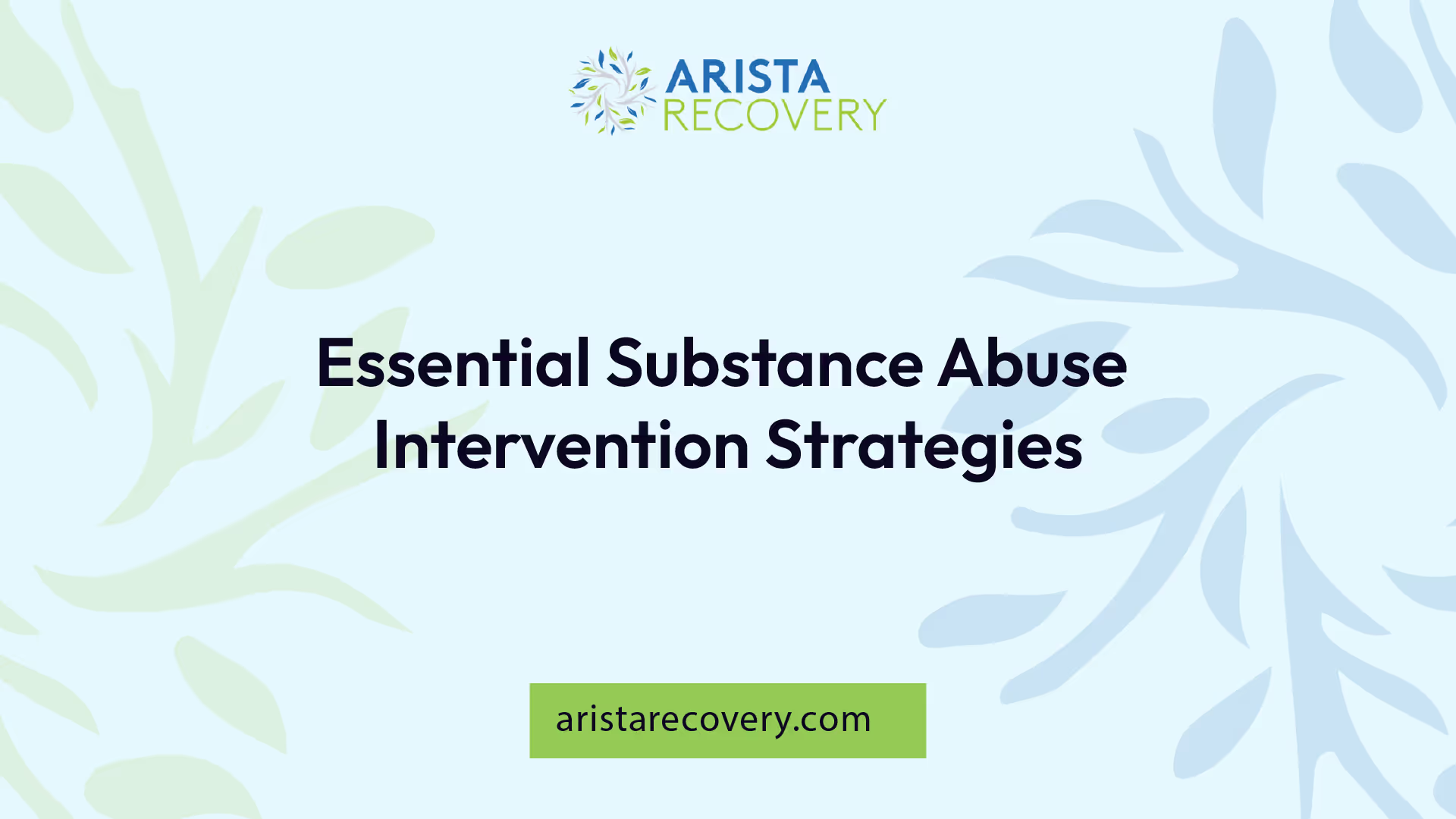Essential Substance Abuse Intervention Strategies


Intervention Strategies
Substance abuse intervention strategies are essential for individuals struggling with addiction. This section will discuss various effective approaches, including counseling techniques and the benefits of group therapy.
Counseling Techniques
Counseling plays a pivotal role in substance abuse intervention strategies. Different methods are utilized, each targeting specific needs of individuals dealing with addiction. Notable techniques include:
These counseling techniques are provided by trained professionals in various environments, ensuring tailored support for individuals based on their unique circumstances.
Counseling TechniqueDescriptionCognitive Behavioral TherapyIdentifies and alters harmful thought patternsMotivational InterviewingEncourages exploration of motivations for changeContingency ManagementOffers rewards for positive behaviors
Group Therapy Benefits
Group therapy is a widely recognized method for substance abuse treatment. It allows individuals to come together and discuss their experiences with addiction in a supportive environment. Participating in group therapy provides numerous advantages:
Led by professionals, group therapy sessions create a structured environment for discussing drug use and recovery strategies. It serves as an integral part of comprehensive addiction treatment and can significantly enhance the efficacy of individual counseling efforts [1].
For further resources on supportive systems during recovery, explore our article on addiction recovery support systems.
Involving Family
Incorporating family into substance abuse intervention strategies can significantly enhance the recovery process for individuals struggling with addiction. This involvement provides not only emotional support but also promotes a healthy environment conducive to recovery.
Family Counseling Importance
Family counseling plays a vital role in effective substance abuse interventions, especially for adolescents undergoing treatment. Engaging family members or partners allows for essential support that aids patients in achieving and maintaining abstinence. This approach is often integrated into comprehensive treatment modalities such as methadone maintenance or partial hospitalization.
The benefits of family counseling include:
Benefits of Family CounselingDescriptionImproved CommunicationEnhances dialogue between family members about addiction.Supportive EnvironmentCreates a nurturing space conducive to recovery.Understanding AddictionFacilitates family members' understanding of addiction dynamics.
Support of Family Members
Family members are instrumental in encouraging individuals in recovery to seek help and stay committed to sobriety. They can create a healthier home environment which is critical for everyone involved. A strong support system is essential for reducing the risk of relapse. Family members often need to work together, fostering a collaborative approach towards their loved one’s recovery [2].
Key points regarding family member support include:
Family Support StrategiesDescriptionEmotional SupportOffer reassurance and understanding to the recovering individual.Active InvolvementJoin therapy sessions to reinforce their commitment to the recovery process.Self-CarePursue personal well-being to maintain a healthy dynamic in the family unit.
By recognizing the importance of family involvement in substance abuse intervention strategies, individuals struggling with addiction can more effectively navigate their recovery, ultimately leading to stronger familial bonds and a more supportive living environment. For more information on support systems available for recovery, visit our article on addiction recovery support systems.
Medication Approaches
Medication is a crucial aspect of substance abuse intervention strategies, helping individuals manage withdrawal symptoms and reduce cravings. Different medications are used for specific substance dependencies, particularly for opioid dependence and alcoholism.
Opioid Dependence Medications
Medications approved for treating opioid dependence include Methadone, Buprenorphine, Oral Naltrexone, and Injectable Naltrexone. Each of these medications serves distinct roles in the treatment process.
MedicationTypePurposeMethadoneFull opioid agonistReduces withdrawal symptoms and cravingsBuprenorphinePartial opioid agonistHelps prevent withdrawal and reduce cravingsOral NaltrexoneOpioid antagonistBlocks the effects of opioidsInjectable NaltrexoneOpioid antagonistSimilar effects to oral naltrexone with less frequent dosing
Medications like these not only help in detoxification but also aid in long-term maintenance, ensuring a smoother recovery process. For further guidance on effective counseling methods in addiction recovery, consider exploring our section on addiction counseling techniques.
Alcoholism Treatment Medications
For treating alcoholism, several medications are effective in helping individuals maintain abstinence from alcohol. The most commonly used medications include Disulfiram, Naltrexone (both oral and injectable forms), and Acamprosate.
MedicationTypePurposeDisulfiramEnzyme inhibitorCauses adverse reactions when alcohol is consumedNaltrexoneOpioid antagonistHelps reduce cravings and withdrawal symptomsAcamprosateGABA receptor modulatorAssists in maintaining abstinence from alcohol
These medications offer various advantages in the recovery process and can be taken orally without requiring visits to specialized clinics, thus providing convenience and flexibility [1].
Medications are an essential component of effective treatment plans for addiction. Discover more about additional recovery support systems in our article on addiction recovery support systems and consider how trauma-informed care can impact treatment success by reviewing our section on trauma-informed care for addiction.
Using medication as part of a comprehensive recovery plan can increase the chances of long-term success and sobriety. For strategies on preventing relapse, see our content on addiction relapse prevention techniques.
Supporting Friends and Family
The journey of overcoming addiction is fraught with challenges, and the role of friends and family is paramount in ensuring the success of substance abuse intervention strategies. Their involvement can significantly enhance the effectiveness of treatment and recovery efforts.
Role of Friends in Recovery
Friends provide a crucial support network for individuals in recovery. Their presence can genuinely impact a person's journey towards sobriety. A supportive friend not only helps the individual stay accountable but also offers emotional encouragement. Positive social support is highly predictive of long-term abstinence rates across multiple addictive behaviors [4]. Key aspects of friendship in recovery include:
ContributionDescriptionEmotional SupportFriends can offer empathy, understanding, and encouragement.AccountabilityThey can help track progress and encourage goals.Positive InfluenceFriends can promote healthier activities and environments.
Healthy friendships can make a substantial difference in a person's recovery and overall health [2]. It is important for friends to engage in non-drinking activities, as this can further reinforce the individual's commitment to sobriety.
Importance of Support Groups
Support groups serve as a vital resource for both individuals in recovery and their friends and family members. These groups provide a safe environment where loved ones can share their experiences, access education, and gain resources to better cope with the challenges posed by addiction.
Support groups can help friends and family understand the dynamics of addiction and recovery, allowing them to foster a more supportive atmosphere at home. Below are some benefits of participating in support groups:
BenefitExplanationShared ExperiencesMembers can learn from others who have faced similar challenges.Emotional OutletProvides a platform for expressing feelings and frustrations.Resource SharingMembers can exchange helpful strategies and coping mechanisms.
Family members, in particular, can play a significant role in encouraging a loved one to seek help and maintaining their sobriety. By working together within a supportive community, families can improve their overall dynamic and healing process [2]. For more information on building effective support systems, explore our article on addiction recovery support systems.
Adolescent Interventions
Effective intervention strategies for adolescents facing substance abuse problems focus on school-based and family-based programs. Both approaches play a vital role in preventing and addressing addiction issues.
School-Based Programs
School-based intervention programs have proven effective in the prevention of substance abuse among adolescents. Research indicates that these programs, when designed with a combination of social competence and social influence approaches, show protective effects against drug and cannabis use.
Important elements of successful school-based programs include:
Program ElementDescriptionAntidrug InformationProviding students with factual information about the dangers of drug use.Refusal Skills TrainingTeaching students how to refuse drugs and resist peer pressure effectively.Self-Management SkillsEquipping students with techniques for managing their emotions and stress.Social Skills TrainingHelping students develop interpersonal skills to build healthy relationships.
Additionally, school-based alcohol prevention interventions that include personalized feedback, moderation strategies, and goal setting have been associated with reductions in drinking frequency among students [5]. This multi-faceted approach helps to create a supportive educational environment where students can thrive.
Family-Based Interventions
Family involvement is crucial in substance abuse recovery and prevention. Family-based interventions have shown small but significant effects in reducing alcohol misuse among adolescents. These programs focus on improving family functioning and communication, ultimately leading to more supportive home environments that discourage substance use.
Key components of effective family-based interventions include:
Intervention ComponentPurposeIntensive Family CounselingTo enhance communication and support within the family unit.Family Skills TrainingTeaching families strategies to foster a healthy home environment.Family Support GroupsConnecting families with others facing similar challenges, promoting shared experiences.
By improving family dynamics, adolescents are less likely to engage in substance use. Such interventions also target modifiable risk factors and bolster protective factors, contributing to a comprehensive addiction recovery support system.
Both school-based and family-based interventions are critical in addressing adolescent substance abuse. It is essential to combine these strategies with ongoing support to ensure sustainable recovery and prevent relapse. For those seeking more information on strategies to help adolescents in crisis, exploring trauma-informed care for addiction may provide additional insights.
Professional Interventions
Brief Interventions Overview
Brief interventions are effective strategies used by professionals like counselors, social workers, physicians, and nurses to address substance abuse challenges. They have proven successful in various settings, including primary care and specialized treatment facilities [6].
Research indicates that these interventions can encompass a range of approaches, from unstructured discussions to formal structured therapy. They can be tailored to fit individuals of different cultural backgrounds and characteristics. A significant framework used in these interventions is the stages-of-change model by Prochaska and DiClemente, which outlines five stages of behavioral change, helping clinicians adapt their methods to the specific needs of each client [6].
The effectiveness of brief interventions lies in their basic components, identified by the acronym FRAMES, which encompasses core elements essential for promoting change. The following table summarizes the five basic steps involved in a brief intervention:
StepDescription1. Introduce the issueOpen the dialogue about substance use concerns.2. Screen and evaluateAssess the client’s level of substance use and risks.3. Provide feedbackOffer constructive insights based on assessment results.4. Discuss change and goalsCollaborate with clients to set achievable change objectives.5. Summarize and closeRecap the discussion and outline next steps.
Relapse Prevention Strategies
Relapse prevention is a critical component in the recovery process, aimed at reducing the likelihood and severity of relapse after addressing substance abuse problems. Research shows that 40-80% of patients treated for alcohol use disorders experience at least one drink within the first year of treatment [4]. Relapses can occur for various reasons, emphasizing the need for effective strategies to manage and mitigate risks.
Important aspects of relapse prevention include identifying and coping with high-risk situations, enhancing self-efficacy, and addressing cognitive distortions regarding substance use. Cognitive restructuring helps individuals reframe their perceptions of lapses, seeing them as learning experiences rather than failures.
A variety of intervention strategies can be employed in relapse prevention, including:
By focusing on these strategies, individuals can develop a comprehensive approach to prevent relapse and maintain long-term recovery. Positive social support is highly predictive of sustained abstinence, reinforcing the importance of surrounding themselves with supportive individuals while reducing negative influences. For further information on maintaining support during recovery, explore addiction recovery support systems.
References
[2]:
[3]:
[4]:
[5]:
[6]:
You’re not alone in this.
When mental health challenges and addiction intersect, it can feel isolating. At Arista, we offer compassionate, evidence-based, and trauma-informed care to help you heal, grow, and move forward.
You’re not alone in this.
When mental health challenges and addiction intersect, it can feel isolating. At Arista, we offer compassionate, evidence-based, and trauma-informed care to help you heal, grow, and move forward.
Support that moves with you.
You’ve taken a brave first step. At Arista Recovery, we’re here to help you continue with best-in-class care designed for long-term healing and support.
.webp)






